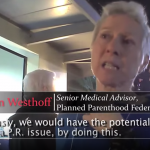Benjamin Corey has a thoughtful word on the abortion  debate. Titled “What Both Sides Completely Miss In the Abortion Debate,” Corey sounds an articulate call on both the pro-life and pro-choice camps to try to understand the issues better. His worry is that both groups are talking past each other, and in the process, missing potential areas of agreement and progress.
debate. Titled “What Both Sides Completely Miss In the Abortion Debate,” Corey sounds an articulate call on both the pro-life and pro-choice camps to try to understand the issues better. His worry is that both groups are talking past each other, and in the process, missing potential areas of agreement and progress.
I was impressed with his boldness is explaining how and when the humanity of the unborn became inescapable reality to him. Corey movingly recalls working as a photographer who provided “remembrance photos” for families who suffered the death of an infant. Taking the photographs convinced Corey that what he was looking at wasn’t simply a “fetus.”
This, was an actual person.
Fingers. Toes. Ears. Feet….
All the parts that a person has.
It wasn’t just a fetus.
During my time as a volunteer with NILMDTS I took portraits of children as young as 18 weeks gestation (twins) to children who died in the womb close to their due date. Yet, whether it was 18 weeks (before the age of viability) or a fully formed baby who died just before natural birth, nothing will ever convince me that one was a “fetus” and one was a “baby”. They were both HUMAN. Some babies were more formed than others, yet no matter which “fetal demise” (a term I’ve grown to hate) I was taking portraits of, it was clear to me that these were real people.
If I wasn’t truly pro-life prior to that experience, I was after.
Corey’s wish for the pro-choice camp is that they engage more seriously the concept of fetal personhood instead of reframing the issue as an excluseively”women’s body” debate. Corey reminds pro-choicers that abortion is an issue with “huge ethical considerations” that are not binary but require consideration of the baby, as well as the mother.
He then turns to the pro-life camp. Unfortunately, this section is much less moving. Corey reprimands pro-lifers for obsessing over “legal victories” and committing the same mistake as the pro-choice side: Namely, missing the issues at hand. Pro-lifers, Corey says, believe so firmly in the “Overturn Roe and abortion will be solved” mantra that they are rendered ineffective in the dialogue.
In fact, to test how much they actually believe in this logical sequence, one only need to try it in the context of a gun discussion with a pro-lifer (feels ironic to say that). I’ll bet dimes to dollars they immediately reject your logic, and tell you that outlawing guns won’t stop gun violence. Instead, they will argue that we must work to eradicate the reason gun violence occurs in the first place. I often find it strange that the same group of people will simultaneously accept and reject the exact same logical argument. The pro-life movement is seriously missing something.
And here’s what they’re missing: finding a solution to unwanted pregnancies will be a messier, more complex, and more expensive solution than they appear willing to go to. In order to end a practice, one cannot simply outlaw the practice– one must instead undercut the reasons why a practice occurs in the first place. However, it is much easier to pass a law that requires little to no sacrifice on our own part– it allows us to go to sleep with a faux peace that we actually eradicated something. It is such a sad and flawed approach to a very complex issue that involves real people.
That means if the pro-life movement really wants to end abortion they need to stop focusing on winning a legal victory and calling it good. Instead, they need to be willing to look at hard things like poverty, access to affordable healthcare, livable minimum wages, education inequality, etc. As of today, the position is often one where they want women to be forced to give birth to a child, but are completely unwilling to make sure that child and the mother have the things they need to survive. In the current discussion, if one defends the pre-born they’re “pro-life” but if one defends the post-born, they’re a socialist.
First, I think his overall point is correct. The idea that overturning Roe would signal final victory for the forces of life is wrong on its face. It seems also to be increasingly scarce. The pro-life movement, at least from where I’m sitting, has for the last few years assumed a more proactive, grassroots posture. Issues like orphans adoption, crisis pregnancy centers and other abortion alternatives have come to the forefront of the evangelical pro-life culture. I’m not denying that the overturning of Roe is a major concern of pro lifers. But I think its fair to point out that the principle of Roe is not pro-choice, per se, but anti-choice, the judicial prohibition of legislating against abortion. There are legitimate arguments against that decision that don’t touch on the wider moral arguments that Corey mentions. So if a pro-lifer expresses desire that Roe be overturned, it’s not necessarily because they believe it will solve the abortion debate (and if they do believe that, they’re wrong), only that it would right a significant wrong in American politics.
Second, Corey makes the very common assertion that pro-lifers don’t care enough about poverty, injustice, et al. I’ll agree with him that the pro life movement needs to be a fuller-orbed worldview that has real answers to these questions. However, too often the issue of poverty is used as a smokescreen by the pro-choice camp to blur the question of what to do about abortions themselves. If its true that contemporary pro-life theory lacks a sufficient worldview of compassion (and it might), then those questions have to be addressed clearly and in their own right. What can’t be accepted is that until the pro life camp gets it together on poverty, abortion on demand will have to do. This is simply a false dichotomy. It feeds off the belief that abortion is somehow helpful or necessary for poor communities. But what about when abortion is used as a siphon?
The most significant tension between pro life and pro choice is still, after all these years, whether abortion on demand should be legal. Navigating the tertiary issues connected to the debate will not achieve the progress that Corey desires until the primary question is answered. More disasters like the Gosnell horror might well be fomenting in a culture in which “safe, legal, and rare” seems to be a lost fantasy.
The pro-choice side needs to be more honest about what kind of culture they desire. Legal availability of abortion for rape victims is a popular talking point, but the data is overwhelmingly oriented towards unintentional pregnancy through consensual sex. I will be greatly encouraged when someone from the pro-choice camp says that abortion is not a legitimate method of birth control. What’s taking so long?
Corey’s attempt to occupy the center has merit, and he makes an important point about honesty for both sides. But he doesn’t supply an adequate definition of “progress.” He implies that the pro-choice side wants to see progress on poverty, healthcare and community caretaking. That is indeed progress that needs to happen, but it is not progress on the abortion front. It does no good to wait until you can properly help the living before you rescue the dying.
The question of fetal personhood is not a gradated issue. The comparison Corey makes between gun violence and abortion is a non-starter; abortion is by definition, according to pro-life, murder. Either this argument works or it doesn’t. Controlling abortions is not of any interest to the pro-life camp, because we see the issue in terms of human personhood. If the pro life movement needs a framework that speaks to life outside the womb, then the pro choice camp needs a definition of human life itself. The pro-life movement has put their cards on the table; when will pro-choicers do the same?











